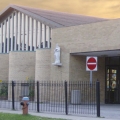Like many young people, Thomas has been spending most of his recent time preparing for high-school exams, playing basketball with friends and following the end of the NHL season. That’s a long way from where he was a few weeks ago — unsure each night if he’d have a bed to sleep in.
Orphaned at six years old, Thomas has moved from foster home to foster home.
As he got older, he spent some time couch-surfing from one friend’s place to the next. Eventually he got his own apartment, sharing rent with his younger brother and a friend. But the other two walked out on the deal, leaving Thomas with a lease he couldn’t afford and no family to support him.
So how did Thomas go from near homelessness to becoming a typical teenager? It began when he was directed to Covenant House Toronto.
Thomas knew about Covenant House, but hadn’t considered it an option until it was recommended by a social worker from the Catholic Children’s Aid Society.
AA has a healing mission
By Luc Rinaldi, Catholic Register SpecialThe only requirement to join Alcoholics Anonymous is a desire for sobriety – and maybe a belief in God.
Two Toronto AA groups were recently removed from the organization’s official directory for altering the Twelve Steps, a traditional set of guidelines to battle addiction created by AA founder Bill Wilson. The two non-religious groups, Beyond Belief and We Agnostics, removed all mention of God or a higher power from the steps and, as a result, are no longer affiliated with AA.
While sympathetic with the decision to delist the two organizations, many supporters of the 12-step program caution against letting this debate interfere with the healing mission of AA.
Sr. Miriam Ukeritis, CSJ, the chief executive director of Southdown Institute, a mental health centre for Catholic clergy, many of whom are dealing with addictions, said that, while her organization uses the Catholic faith to help battle addictions, they “don’t go on the belief that if you pray, all your troubles go away.”
ISARC debate focuses on poverty issues
By Michael Swan, The Catholic RegisterISARC, an ecumenical and interfaith coalition supported by Ontario’s bishops and Catholic religious orders, went ahead anyway and at least one debater said the Conservative absence was irrelevant.
“Poverty will be an issue. You can’t ignore it. It’s not going away,” said Etobicoke Centre Liberal MPP Donna Cansfield.
Whether poverty is an issue when the election heats up in the fall will be up to churches, mosques and temples, said ISARC executive director Michael Skaljin.
“The faith communities are not going to be silent on this,” he said.
Eritrean Catholics caught in Libyan civil war flee to Canada
By Michael Swan, The Catholic RegisterSalamawit Mehari tells the story of her cousin, Nardos Haile, who tried to make the desperate voyage from Libya to Italy with her three children. As the boat began to disintegrate in the Mediterranean and her husband turned to help neighbours, Haile held tight to her 16-month-old — and watched helplessly as her four-year-old and six-year-old were swept overboard.
At Toronto’s St. Nicholas of Bari parish, a new community of Eritreans are mourning friends lost to the Mediterranean. Wedlep Habtemical thinks he knows 20 who died at sea. Goitom Abrha recalls 25. Selam Tesfaselasy remembers 14 members of her church choir.
These refugees are part of a growing group of Eritreans caught in the Libyan civil war who have made their way to Canada. The tiny Toronto Eritrean Catholic Community of St. Nicholas Bari, under Capuchin Fr. Vittorio Boria, is supporting 35 refugee sponsorships through co-sponsorship and doing its best to help new arrivals settle and focus on their futures.
To be a refugee in Libya is its own circle of hell. Add in a civil war and it gets worse.
NDP Catholic MPs stress their social Gospel roots
By Deborah Gyapong, Canadian Catholic NewsOTTAWA - The NDP passed a number of resolutions at its 2011 policy convention that could appeal to voters who care about social justice, say two of the party’s Catholic MPs.
“I think there’s so much of the NDP that was founded in the social Gospel,” said NDP MP Charlie Angus, now the Official Opposition ethics critic. “People think we came out of labour, but we came out of the churches as well, the fight for social justice.”
The NDP wound up its convention in Vancouver June 17-19 fresh off an historic win in May that saw the party shoot past the Liberals to become the Official Opposition. Despite the NDP’s support for abortion and same-sex marriage, Angus contends there’s a lot for Catholic voters to like about his party.
In every speech, NDP Leader Jack Layton talks about a Canada where “no one is left behind,” said Angus, who represents the Ontario riding of Timmins-James Bay. “I think that’s something that people in the pews understand in their heart. They know we are in a very rich country, but something’s not working.”
Nova Scotians find opportunity in crisis
By Michael Swan, The Catholic Register>ANTIGONISH, N.S. - On April 13 the little wooden church on the hill overlooking Maryvale burned down. Located in the diocese of Antigonish, it was a mission church — one of four churches served by the priest in Lakevale. St. Mary’s was insured, but the insurance won’t fully pay to replace the 150-year-old structure.
A pretty good case can be made that the diocese needs that insurance money more than the people in Maryvale need another church. The diocese of Antigonish, comprising Cape Breton and three counties in Northeastern Nova Scotia, must raise $18 million to compensate victims of clerical abuse. If St. Mary’s is not rebuilt, Maryvale Catholics only have a 15-minute drive to Georgeville for Mass on Sunday. Yet the parish has decided to rebuild.
In their resolve, they resemble the broader Catholic community in Nova Scotia that is working to rebuild a shattered Church.
“There’s tremendous symbolism in that building,” said parishioner Terry O’Toole. “The diocese has been hurt. The parish has lost its church. But now there are people who can’t do enough for the building committee, the fundraising committee and the parish council. That crisis has really created opportunity.”
Prostitution immoral and exploitative, court hears
By Sheila Dabu Nonato, The Catholic RegisterStriking down Canada's anti-prostitution laws would violate the “fundamental moral values” of protecting human dignity, and would infringe on a woman's rights to liberty and security, lawyers representing the Catholic Civil Rights League told the Ontario Court of Appeal.
“Prostitution is antithetical to the fundamental values of Canadians,” said lawyer Ranjan Agarawal on June 16. He was representing the Catholic Civil Rights League, the Christian Legal Fellowship and REAL Women of Canada.
“Prostitution is immoral. It takes the most intimate human activity and commodifies it. It is that commodification that causes violence, drug use, the trafficking of women, the exploitation of women in the economic margins of society.”
The federal and Ontario governments are appealing an Ontario judge's decision that struck down some sections of Canada’s prostitution laws as being unconstitutional.
Conference to celebrate the Eucharist
By Luc Rinaldi, Catholic Register SpecialFor 25 years, St. Philip Neri Parish has been a “sanctuary” for the Hispanic Catholic community in Toronto.
On June 25 and 26, the parish will celebrate this quarter century with a two-day conference on “The Living Eucharistic Presence of Jesus.” The conference, entirely in Spanish, will feature Guatemalan preachers Rev. Oscar Gracias and Juan Ramón Martinez Hernandez, and coincides with the feast of Corpus Christi.
“That is the centre of our life,” said organizer Ignacio Mateo of the feast and the theme it inspired for the conference. “We gather as Latin-American people, and we gather for one reason — the blessed sacrament, the holy Eucharist. That is the reason we are united, why we live.”
Both days of the conference will include the rosary, Mass, and a procession of the blessed sacrament. The first day will focus on four themes — the Old Testament, Church life, education, as well as life, healing and liberation — in relation to the Eucharist. The speakers will address these themes and, on the second day, focus on unity and family within the Eucharist.
Media fast introduced for new seminarians
By Luc Rinaldi, Catholic Register SpecialWhen Thomas Collins was in the seminary, he felt like the busiest, most rushed guy in town. Now, as Archbishop of Toronto, he wants to give seminarians a chance to stop and reflect — something he wishes he could have done more often.
For the incoming class at St. Augustine’s Seminary, that will mean a media fast — abstaining from electronic and traditional media of all types — for much of their first year. No phones or cellphones, no Internet or computer games, no TV or radio. No modern devices or even old friends like newspapers and magazines.
Beginning in September, the new class of seminarians will take part in a type of spiritual preparation called a propaedeutic year. The 10-month period, which falls between formation (at places like Serra House) and the traditional studies of the seminary, is meant to prepare discerning priests in a non-academic setting.
It will include reading traditional Church texts, a collection of retreats and, for five and half days per week, a “fast” from electronic and popular media.
Conservative policy convention supports traditional marriage and parental rights
By Deborah Gyapong, Canadian Catholic NewsOTTAWA - The Conservative Party has given a ringing endorsement to traditional marriage, to family life and the rights of parents to raise children according to individual conscience and beliefs.
At its 2011 policy convention, held June 9-11, the Conservatives resolved to support legislation “defining marriage as the union of one man and one woman.” They also stressed that Parliament, not the courts, should determine the definition of marriage through a free vote.
“This is a party that’s not afraid of being conservative,” said Immigration Minister Jason Kenney, a Catholic, in an interview. “It’s a dramatic change from the days of the old Progressive Conservative Party where social conservatives were not made to feel welcome.”
The party passed a resolution on family and marriage that affirmed the family unit is “essential to the well-being of individuals and society, because it is where children learn values and develop a sense of responsibility.” The resolution also stressed “the right and duty of parents to raise their own children responsibly according to their own conscience and beliefs.”
Marshall sentenced to two years in prison
By Ron Stang, Catholic Register SpecialWINDSOR, ONT. - Father William Hodgson Marshall was sentenced to two years in prison for sexually abusing 16 boys and one girl in Ontario high schools while he was a teacher, coach and principal from the early 1950s to the mid-1980s.
Marshall, 88, was also given three years probation and his name will be added to the national sex offender registry. He pleaded guilty to charges of indecent assault that occurred in schools and private residences, from Windsor to Toronto, Sudbury and Sault Ste. Marie.
For the victims, it was an emotional two days in Superior Court where the priest pled guilty prior to numerous victims giving pre-sentence statements.
Ken Hills, one of Marshall’s earliest victims, was abused at Toronto’s St. Michael’s High School in 1953. His assault occurred in an office by the gymnasium where Marshall coached basketball.
“You began stalking me when I was in Grade 8,” he told the court. “This predatorial action continued through grades nine and ten and eleven.”










